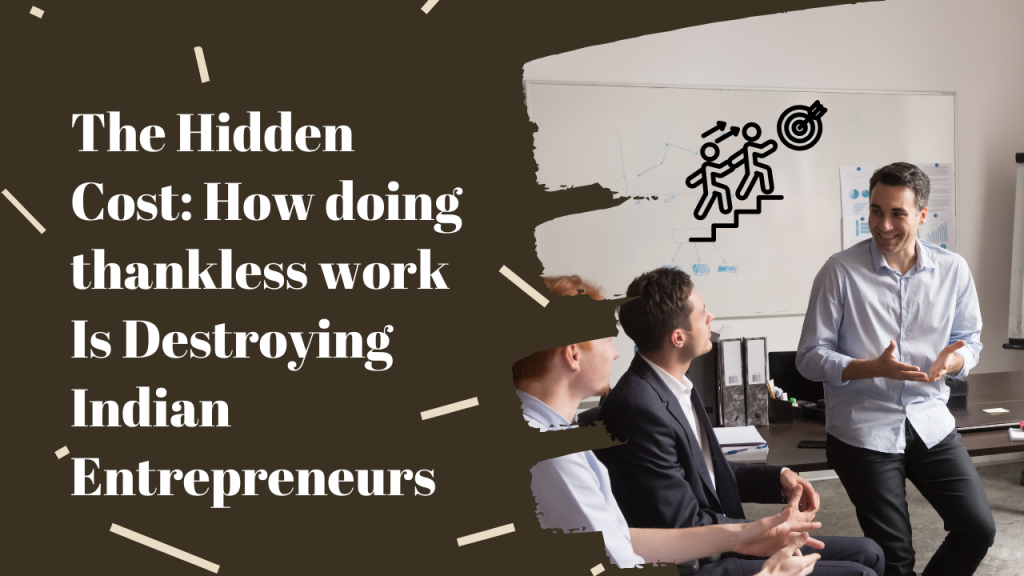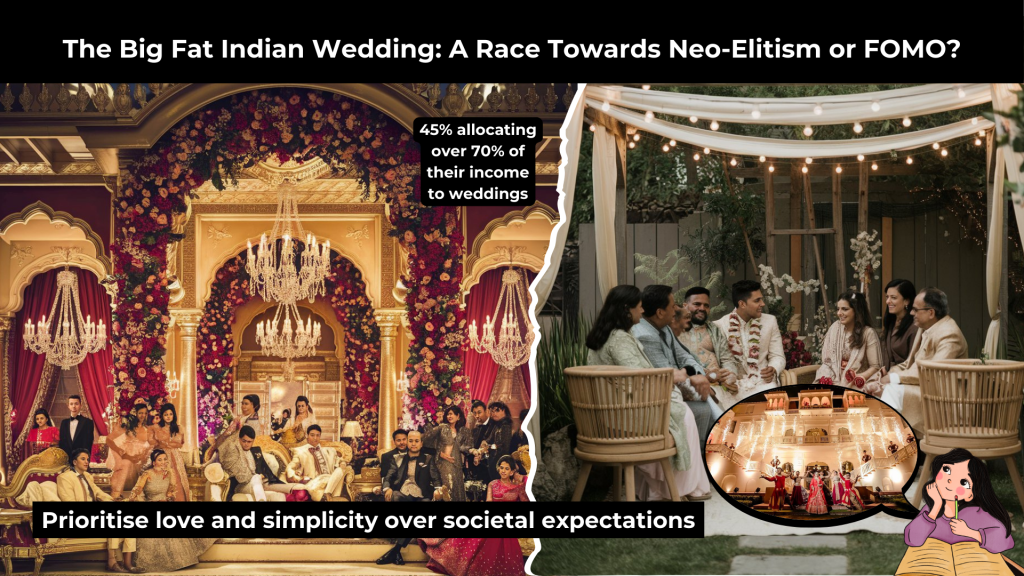
The Hidden Cost: How doing thankless work Is Destroying Indian Entrepreneurs
Many Indians hold the life of a solopreneur or entrepreneur in high esteem. Their contributions to society, the economy, and

Setting: A Warm Delhi Living Room
As Sunita relaxed on her couch, she continued to peruse Instagram. Pictures from her cousin’s wedding began appearing on her feed. The varmala was under a magnificent floral canopy, and each ceremony took place at a destination venue in Udaipur. The bridesmaids wore designer lehengas.
Um, she whispered something under her breath.
Ramesh, her husband, shifted his gaze from his computer. “So, what?”
“Check this out,” Sunita yelled at him, thrusting her phone in his face. Naina’s nuptials. This place is so Bollywood! Consider the furnishings! The clothing, meanwhile, are haute couture, not to mention designer.
Raising an eyebrow, Ramesh took a quick look at the images. “What amount do you believe they shelled out?”
“I would say at least a crore,” Sunita speculated, her voice betraying her jealousy. “And here we are, arranging for the local banquet hall to host Priya’s wedding.”
“I can’t believe it,” Ramesh said grimly. It’s only for a day, Sunita. Is there any significance to it?
Sunita, on the other hand, had her thoughts racing.
The Neo-Elitism of the Modern Era
The upper middle class in India is becoming more and more entangled in a neo-elitist arms race, particularly around weddings. Nowadays, weddings are more about making a statement than about bringing two families together.
“People aren’t hosting weddings anymore, they’re hosting spectacles,” remarks Dr. Meera Sharma, a sociologist dedicated to studying cultural trends. “Flaunting wealth and status is more important to many than following tradition. Particularly the upper middle class is under pressure to maintain their standard of living comparable to that of the wealthy elite.
The Mental Illness of Fear of Missing Out
This whole thing is based on a mental illness called Fear of Missing Out (FOMO), which makes people feel bad about themselves if they don’t partake in something that other people are enjoying.“
In this social media era, FOMO has skyrocketed,” Dr. Sharma says. As an example, consider weddings. People feel pressured to throw lavish parties because they see other people doing it and don’t want to seem ‘lesser’ in society. These days, it’s more of a contest than a mere celebration.
Dialogues on the Core Issue
Sunita and her friend Meenal had coffee a few days down the road. “Meenal, I am unsure.” According to Sunita, Priya is deserving of nothing less than top treatment.
“But is it something she really wants?” Meenal enquired.
“What worries her is the opinion of others, even though she claims she would be happy with a modest ceremony. Udaipur was the site of three separate events for Naina. Why is Priya’s wedding looking so simply? ”
Effulgently, Meenal drooled. Sunita, can you fathom how absurd this is going to sound? I don’t even like these people, and you’re spending all this money on them!
It’s about more than just us, Sunita said. “We want to prove to Priya’s in-laws that we’re anything but ordinary,” she said.
The Effect on the Budget
The wedding market in India is massive, with an estimated value of ₹3.75 lakh crore in 2024 and a growth rate of 25-30% per year.
– A The wedding costs account for more than 70% of the income for 45% of upper middle class families, according to a survey by a prominent wedding planner.
– An additional 60% end up in a bind financially after the festivities are over because they relied on loans or credit cards to pay for them.
Financial expert Rakesh Malhotra warns that families risk ruining their future savings by spending more than they can afford.
The Mental and Emotional Cost Money isn’t the only thing that gets hit. All the stress and anxiety that comes with these extravagant weddings is real.
“Organising a wedding has turned into a nerve-wracking ordeal,” remarks Dr. Sharma. “Brides and grooms carry the burden of trying to please everyone, parents are under pressure to meet societal expectations, and family disputes over money and decisions are common.”
It’s Time to Break the Cycle
Details, such as guest lists, caterers, and décor themes, began to pile up as Priya’s wedding date drew near, leaving Sunita overwhelmed. Priya sat down with her parents one night. “I have something important to discuss with you, Mama and Papa,” she started. “Beta?” I asked. While preoccupied with the roster of photographers displayed on her laptop, Sunita enquired.
“I am not interested in a lavish wedding,” Priya declared with conviction.
Sunita was startled and looked up. And the question is, “why?” It is the day of your triumph!
“It’s my special day, not a circus,” Priya responded. What other people think is irrelevant to me. That sum would be better put aside for my future needs. Let’s do something modest but significant.
In agreement, Ramesh gave a nod. I agree with her, Sunita. “Let us not be caught in this trap.”
A Developing Protest T
here is a tiny but rising movement among young Indians, and Priya’s position reflects that, to end the cycle of extravagant weddings.
“Millennials and Gen Z are starting to prioritise experiences and financial security over societal expectations,” says Dr. Sharma. “Simpler, more meaningful celebrations are being preferred as they question the necessity for grandeur.”
Keep Out of the Pitfall
If you or a member of your family is concerned about emotional spending, consider the following:
1. Decide How Much You Are Willing to Spend and then Keep to That Amount.
2. Prioritise What Matters Most: Invest in the things that your loved ones and you cherish the most.
3. Disregard Distractions: Keep in mind that approval from others is temporary.
4. Make sure everyone is on the same page by having honest discussions about expectations with your family and children.
5. Put money aside for future objectives rather than spending it all on a one-time whim.
A Happily Ever After
With only immediate family and close friends in attendance, Priya tied the knot in a modest garden setting near their hometown. There was a personal touch to the ceremony, the reception was lovely, and everyone went home with fond memories.
Looking through the wedding album brought a smile to Sunita’s face months later. After telling Ramesh, “It was perfect,” she finally told him.
He made a joke about how we didn’t even have to sell a kidney.
After months of turmoil, Sunita finally felt calm. It was the finest decision they had ever made, prioritising love and simplicity above conforming to society norms.
© Dr. Pratik P. SURANA (Ph.D.)
Quantum Group
#IndianWeddings #NeoElitism #WeddingCulture #SimpleLiving #FOMO #TraditionVsTrend #LoveNotLuxury

Many Indians hold the life of a solopreneur or entrepreneur in high esteem. Their contributions to society, the economy, and

Staying competitive, inventing new things, and achieving sustainable growth are constant goals for organizations in today’s interconnected and fast-paced global